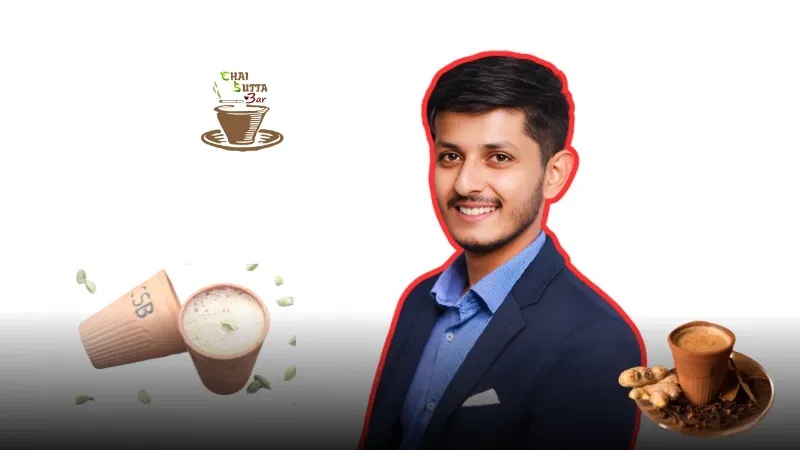Summary:
- Born in Rewa, Madhya Pradesh, Anubhav Dubey gave up his IAS dreams in 2016.
- Started Chai Sutta Bar in Indore with friend Anand Nayak and ₹3 lakh.
- The brand now has over 550 outlets in India and abroad with ₹150 crore turnover.
- The business employs 150+ professionals and empowers 250+ potter families.
- Built not just a business, but a brand rooted in cultural emotion and simplicity.
In the heart of Rewa, a small town in Madhya Pradesh, a young man was preparing to become a civil servant. Like thousands of Indian youth, Anubhav Dubey was groomed on the dream of the UPSC—books, libraries, mock tests, and sacrifices. But in 2016, just before his next attempt, something shifted.
“I didn’t want a life on someone else’s terms anymore,” he said in an interview.
Anubhav took ₹3 lakh from his savings, teamed up with his friend Anand Nayak, and rented a tiny space near a girls’ hostel in Indore. The duo bought secondhand furniture, wrote “Chai Sutta Bar” on a wooden plank, and opened shop. No business degree. No brand consultant. Just one belief: India will always need tea, and tea will always bring people together.
Brewing Culture: The Rise of Chai Sutta Bar
It wasn’t just the tea—it was the kulhad, the earthen cup. It wasn’t just the name—it was the attitude. “Chai Sutta Bar” was youthful, quirky, a little rebellious—and that’s why it worked. In a world of overpriced coffee chains, Dubey served warmth and identity with every cup.
He didn’t have an MBA, but he understood something deeper: emotion drives consumption in India. From college students to young professionals, people flocked to Chai Sutta Bar not just for the tea—but for the vibe.
Their marketing? Word of mouth.
Their expansion plan? Franchising with a soul.
Their supply chain? Grounded in tradition.
They began sourcing kulhads from local potter families—today over 250 families depend on Chai Sutta Bar for steady work. Every cup serves not just a customer—but supports a livelihood.
Scaling with Soul: From One Stall to 550+ Outlets
What started as a 100 sq. ft. shop in Indore is now a ₹150 crore business with a presence in Dubai, Oman, and the UK. The company now has:
- 550+ outlets across 320 cities,
- 150+ full-time employees, including engineers and MBAs,
- Over 4.5 lakh kulhads of tea served daily,
- And a growing global fanbase of desi chai lovers.
What’s surprising is that Dubey never wanted to be rich. “I just didn’t want to regret not trying,” he once said. It wasn’t a startup pitch—it was a life choice.
And yet, his life became the pitch. His story inspired dozens of chai-preneurs and small-town dreamers who didn’t go to IITs, IIMs, or abroad. He made chai aspirational—without losing its roots.
Case in Point: The Hyderabad Outlet That Changed a Community
In 2024, Chai Sutta Bar opened an outlet in Saidabad, Hyderabad. The franchise owner was a 26-year-old woman who had once failed in her first venture. Inspired by Dubey, she gave her dream another shot. Within weeks, her outlet became a local hotspot.
Today, she employs 8 people, sources kulhads from Telangana’s rural artisans, and proudly calls herself a “tea boss.”
That’s what Dubey built—not just a business, but a platform for second chances.
Conclusion: The Boy Who Chose Kulhad Over Khaki
Anubhav Dubey’s story is not just about tea—it’s about trusting yourself when the world wants you to follow the tried-and-tested path. He turned down the IAS dream, only to create a national movement around a clay cup.
He reminds us that ambition doesn’t always wear a suit or hold a government badge. Sometimes, it wears flip-flops, stands behind a tea counter, and serves hope in a kulhad.
And in a country of a billion dreams, maybe that’s the kind of revolution we need—one cup at a time.



